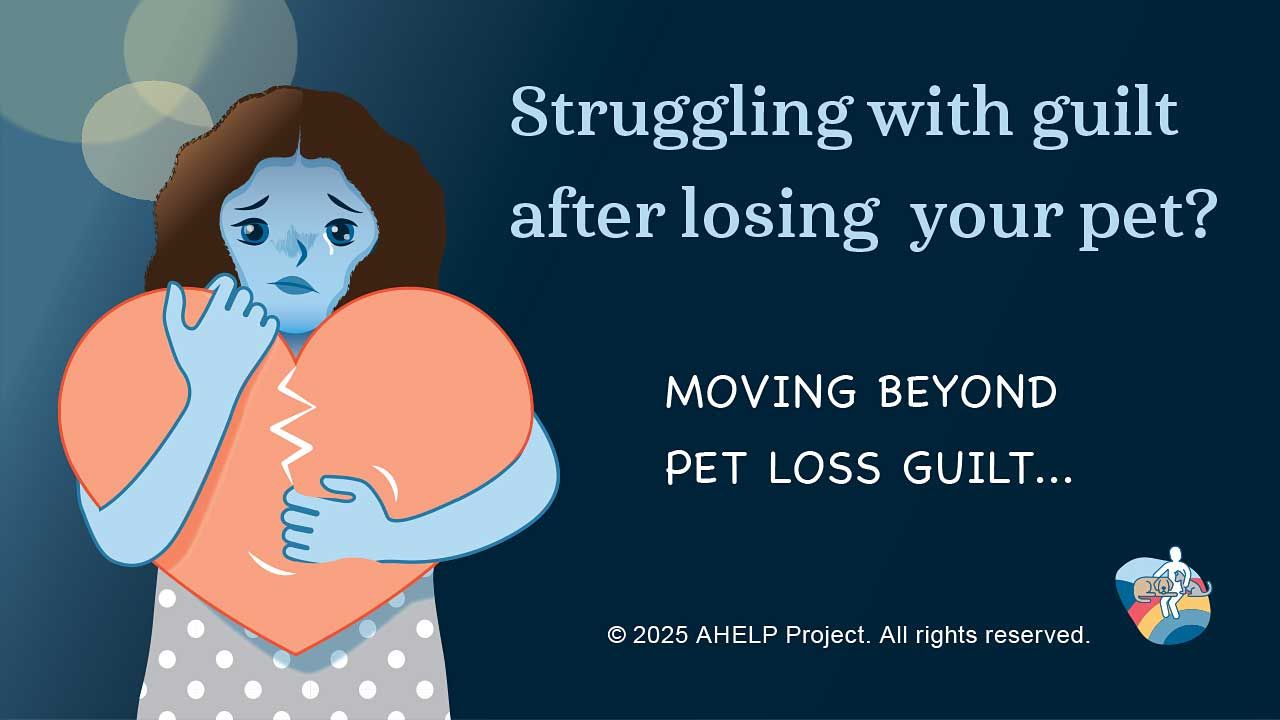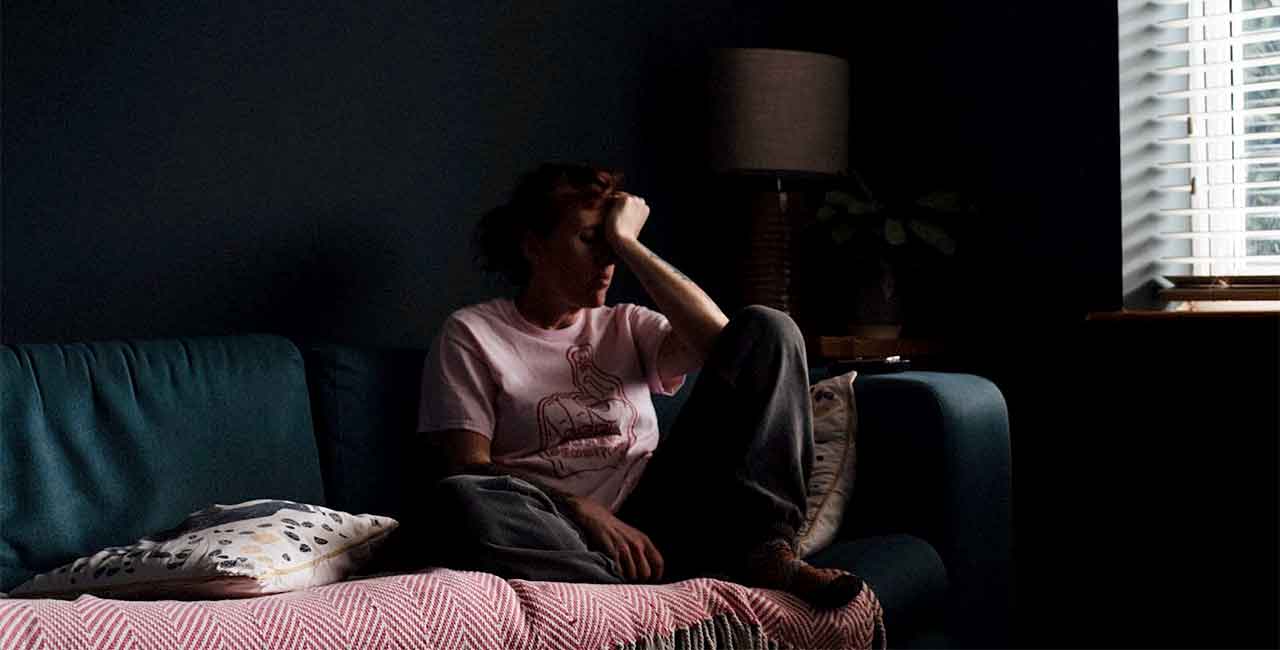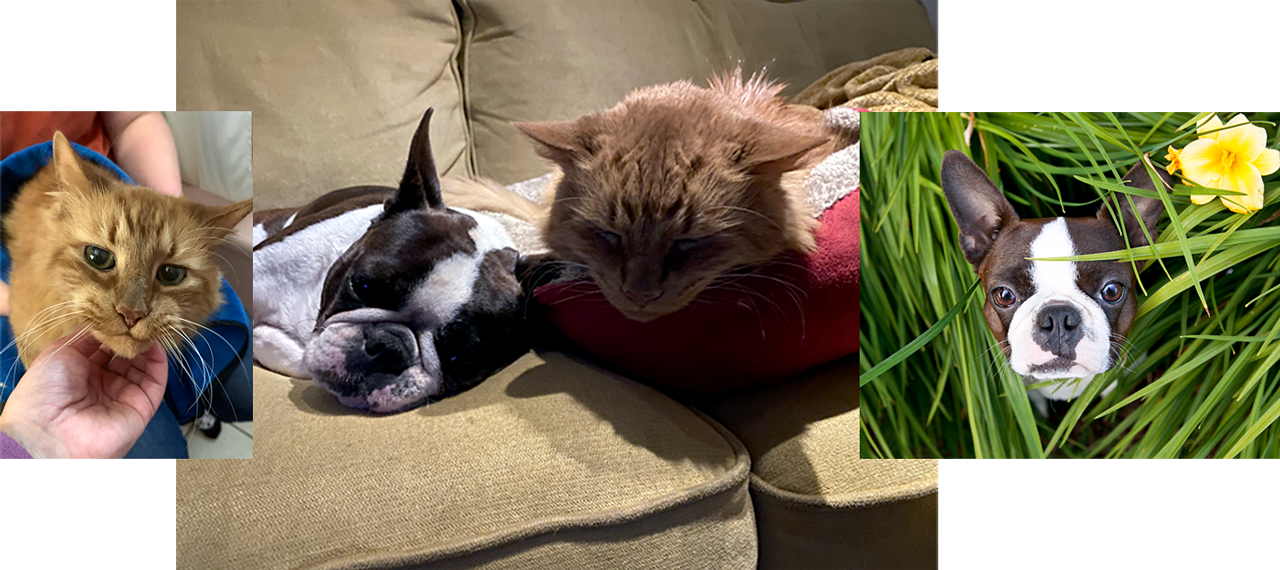
Moving Beyond Guilt: A Guide to Find Healing After the Loss of a Beloved Pet
By Michelle Nichols, MS, HonCAHP, CGRS | Animal Hospice Coach, Educator, Mentor, and Certified Grief Recovery Specialist, AHELP Founder
Every second Sunday of September, on National Pet Memorial Day, we pause to honor the memory of our beloved dogs, cats, and animal companions. It’s a day filled with love and remembrance—but for many, it also stirs up the pain of unresolved grief.
It is so common for pet parents to replay painful “woulda-shoulda-coulda” questions after a loss:
- I would have chosen another treatment if I had known the outcome.
- I should have gone to the veterinarian sooner.
- I could have noticed more about their changing quality of life.
These thoughts weigh heavily on grieving hearts. This National Pet Memorial Day, as you honor your pet’s life and the joy they brought to yours, I invite you to consider letting go of some of these heart-wrenching feelings in their honor. Your beloved companion, now at the Rainbow Bridge, would want your memories of them to shine with love, not guilt.
In this blog, we’ll walk through:
- Why guilt feels so strong—and why it’s often regret in disguise.
- Why you need to let go of the myth of the “perfect decision.”
- Why you may need more than veterinary care—and how to know whether an animal hospice coach or a licensed mental health professional is the right support for you.
Why Guilt Feels So Strong After Losing a Pet
Many pet parents describe feeling “guilty,” but in truth, most aren’t guilty at all. Guilt implies intent to harm—something judged in a courtroom. As a loving caregiver, you didn’t wish harm on your companion. You gave them love, comfort, and in many cases, even end-of-life comfort care.
What you’re more likely experiencing is regret: wishing things had gone differently. You may regret not having more time, regret about a treatment choice, or regret that you didn’t recognize subtle changes in your pet’s quality of life sooner.
Regret is rooted in love. But left unaddressed, it can harden into guilt and self-blame. And unlike other forms of grief, guilt doesn’t ease with time alone. It takes intention, reflection, and often guidance to soften its hold.
Why Guilt Doesn’t Fade on Its Own
Guilt can act as a shield, keeping you in your head instead of your heart. It feels safer to analyze and second-guess than to fully face the pain of loss.
- Many of us don’t know what grief is “supposed” to look like.
- Grief itself can feel overwhelming and frightening.
- Current losses often stir up unresolved grief from the past.
- Endless questioning can create the illusion of control.
Some pet parents even feel that staying in guilt keeps them “loyal” to their pet’s memory. But holding on to guilt doesn’t bring healing—it keeps you stuck, unable to embrace the love and comfort your pet would want for you.
That’s why reframing guilt into regret is so important—it allows you to see your decisions as acts of love, not failures.
Letting Go of the Myth of the “Perfect Decision”
One of the biggest traps after pet loss is believing you should have made the “perfect” decision—especially about euthanasia. Many parents ask: Did I wait too long? Did I let go too soon?
The hard truth is: there is no perfect decision. The idea of a single “right time” to say goodbye is a myth.
Your bond with your pet was unique. You knew them better than anyone else, and your choices came from love, even in the hardest moments. Recognizing that perfection is unattainable helps lift the pressure and opens the door to forgiveness.
What You Can Do to Move Through the Guilt and Feel Better
Once you’ve released the myth of perfection, the next step is self-forgiveness. Just as we forgave our pets for mistakes—chewing shoes, scratching the sofa, making messes—we can extend that same compassion to ourselves.
Here are two simple tools that can help you move forward:
Tool 1: List of Affirmations for Pet Loss Guilt and Regret
Affirmations help interrupt painful cycles of self-blame and gently remind you of the truth: your love was always enough. 💜
- I did my best with the knowledge and resources I had.
- My beloved animal companion knew my love every day of their life.
- Even if things didn’t go as I hoped, my choices came from my heart.
- My animal would not want me to suffer; I choose to heal in their honor.
- I cannot change the past, but I can learn from it and grow.
- Love, not guilt, is my pet’s legacy to me.
- Forgiving myself is the most compassionate way to honor their memory.
Tool 2: List of Journal Prompts to Heal from Pet Loss Guilt and Regret
Writing can help release emotions, uncover truths, and foster peace. Try reflecting on these questions:
- What choices did I make that showed love and care for my pet, even if the outcome wasn’t what I hoped?
- If my pet could speak to me now, what would they say about the way I cared for them?
- What unfinished words of love, apology, or gratitude would I like to share with my pet?
- How can I honor my pet’s memory in a way that brings me comfort and peace?
- What lessons has this loss taught me about love, compassion, and forgiveness?
- What would it look like for me to forgive myself?
- What daily practice—such as lighting a candle, taking a walk, or repeating an affirmation—can I begin to honor my healing journey?
When You Need More Than Veterinary Care
Veterinarians provide compassionate support for your pet’s health and palliative care, but they are not trained—nor should they be expected—to guide families through the emotional intensity of grief.
If guilt continues to weigh you down long after a loss—or if it resurfaces while caring for a senior, terminally ill, or frail pet—it may be time to seek more specialized help.
- Animal hospice and palliative care coaches (like AHELP’s Partners to the Bridge Animal Hospice Coaching) can help you explore your emotions, explain the grief process, prepare for decisions, clarify your values, and empower you to find comfort during caregiving.
This added support is important when navigating questions around pet hospice and euthanasia, in-home euthanasia, pet hospice at home, or comfort care for pets.
- Licensed mental health professionals or pet loss–certified specialists can guide you when your pet loss bereavement feels overwhelming, complicated, or tied to past unresolved losses.
Licensed Mental Health Professionals are especially helpful if you don’t feel you are recovering after your loss or if you are feeling so down and are “stuck” in your grief. We encourage you to find help through the Suicide Prevention Hotline at 988 if you don’t have support and are considering hurting yourself.
Photo caption: Pet memorial photos of Michelle Nichols' beloved orange cat, Mickey, and Boston Terrier dog, Bunny. Forever in our hearts!
Honoring the Legacy of Love
Over the years, I’ve learned that the heaviest guilt I carried for past pet losses eventually became my greatest teacher. Each painful experience left me with lessons that now allow me to guide others through topics like animal hospice at home, pet palliative care, dog quality of life, or cat euthanasia decisions.
I see this as my pets’ enduring legacy to me: a gift of love, compassion, and the reminder that forgiveness is the pathway to peace.
At AHELP Project—the Animal Hospice, End of Life, and Palliative Care Project—our Partners to the Bridge Animal Hospice Coaching is designed to help families follow their Path of Least Regrets—clarifying values, preparing plans, and orchestrating care so that guilt never takes root. Our goal is to help you avoid feelings of guilt altogether through coaching, planning, and emotional support. That way, when you look back, healing will come naturally and completely.
💜 If you’re struggling with guilt—whether after a loss or while caring for a senior or fragile pet—I invite you to begin with a Quick Contact Call. It’s a simple way to meet me, ask questions, and see if Partners to the Bridge Coaching feels right for you.
📩 Reach out anytime at [email protected].
✨On this National Pet Memorial Day… ✨I urge you all to give yourself the space and grace to honor your dogs’ and cats’ memories not with guilt, but with the love and light they gave you every day of their life. ♥️
|
( Blog post banner graphic: Copyright © AHELP Project - Blog post, Moving Beyond Pet Loss Guilt - Graphic of female pet parent crying and holding her large broken heart over the loss of her pet, "Struggling with guilt after the loss of your pet?" )
 |
About the Author: Michelle NicholsAnimal Hospice Coach, Educator, and Nonprofit Leader I'm Michelle, the Founder of AHELP Project. I am dedicated to caring for my pets with love, healthy choices, and trusted providers. I'm grateful to share lessons on life and loss through the AHELP Project. I'm looking forward to connecting with you! |
Join Our Newsletter List!
You’ll receive the latest blog posts, useful tools, and plenty of inspiration. As a special gift, you'll receive a FREE Handout Combo download of Animal Quality of Life Indicators to Report to Your Veterinarian AND 40+ Questions to Ask Your Veterinary Team—both a valuable resource!




